
- www.theregister.com Time to make C the COBOL of this century
Lions juggling chainsaws are fun to watch, but you wouldn't want them trimming your trees

- langdev.stackexchange.com How do modern compilers choose which variables to put in registers?
C has the register keyword, originally designed as a hint to the compiler that a variable should be placed in a register rather than on the stack. However this is generally considered an unneeded f...

-
What are some good resources to learn to write very reliable/formally verifiable software?
The University of Pennsylvania offers a free series of books called Software Foundations with the following description: > The Software Foundations series is a broad introduction to the mathematical underpinnings of reliable software. > > The principal novelty of the series is that every detail is one hundred percent formalized and machine-checked: the entire text of each volume, including the exercises, is literally a "proof script" for the Coq proof assistant.
The series includes Verifiable C, which seems very appealing as a way to avoid some of C's infamous "footguns." I haven't read the series myself, but I might in the future because I like math, logic & programs that do what they're supposed to do.
Are there any materials that would be good as alternatives or complements to this series?
Edit: Adding the Vercors Wiki to the resources in this thread
- lackofimagination.org Lessons from David Lynch: A Software Developer's Perspective
While David Lynch offered very little in terms of what his movies meant, he was generous in sharing his views on creativity, work, and life in general. As a tribute to Lynch, I’d like to share my perspective on his life lessons from a software developer’s viewpoint…

-
Any Android Qr app (preferably Open Source) that allows decoding via "open with" or share?
cross-posted from: https://lemmy.ml/post/26048405
> Because, we have here something called "Swiss Qr Bill" (standardized e-bill with Qr code) and some shops send you the bill via email. Would be nice, if i could just tap the qr-image and open with app.
-
Codeberg is currently suffering from hate campaigns due to far-right forces
blog.codeberg.org We stay strong against hate and hatred — Codeberg NewsCodeberg is currently suffering from hate campaigns due to far-right forces,...
-
Can someone explain to me the advantage of mutable objects?
It makes the code icky and hard to debug, and you can simply return new immutable objects for every state change.
EDIT: why not just create a new object and reassign variable to point to the new object
-
kwinit - A CLI to scaffold all sorts of coding projects
github.com GitHub - Kaamkiya/kwinit: Quickstart all your projects with ease!Quickstart all your projects with ease! Contribute to Kaamkiya/kwinit development by creating an account on GitHub.
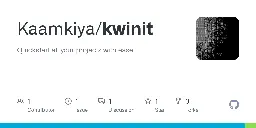
cross-posted from: https://lemmy.ml/post/25903183
> I wrote a CLI tool that generates basic scaffolding for all sorts of coding projects, from Zig applications to NPM packages. > > Feel free to ask questions or contribute!
-
How to make watch faces
I have a samsung smartwatch, and I'd like to make watchfaces for it. The problem is that I tried once and I couldn't find any documentation, not version or basically anything. Somehow, I forgot how, but I managed to print text on a background picture. It was very frankenstein-like.
I'd like to start over with proper everything, so I came here asking on the offchance that any of you can help me with at least documentations. I remember it being in java, however if I can use other languages I would. My mate got the idea to somehow render a webview, because that atleast it's codeable, problem is I have no Idea how to render anything.
Can someone give me links to usable up-to-date docs? Or pre-written webview? I wasn't able to find anything.
- dev.to Why WebAssembly (WASM) is the Future of High-Performance Web Apps
Introduction The web has come a long way from static HTML pages to dynamic and highly...

- www.infoworld.com C++, Go, and Rust gaining popularity – Tiobe
Fast programming languages are gaining ground in the Tiobe index of programming language popularity, but ‘slow’ Python still leads.

-
A dirt simple image viewer
github.com GitHub - Dr-42/imeye: A simple image viewerA simple image viewer. Contribute to Dr-42/imeye development by creating an account on GitHub.
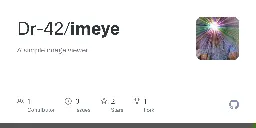
Tired of bloated image image viewers? Well, I was too and hence I created a dirt simple image viewer. Build from source or get it straight from AUR.
- yaledailynews.com “This was CS50”: Yale ends largest computer science course
After a decade of partnership with Harvard, Yale’s CS50 course will no longer be offered starting in fall 2025 due to limited funding and an expanding computer science department.
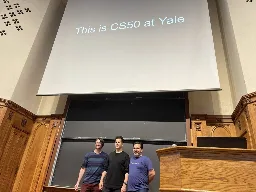
-
Coders or lemmy, what editors do you use? Is it worth learning a new one?
When I was in high school I found Sublime Text and learned "multiple cursors". Since then, I've transitioned to vscode, mainly because I need LSP (without too much configuration work) for my work.
I keep hearing about how modal editing is faster and I would like to switch to a more performant editor. I've been looking at helix, as the 4th generation of the vi line of editors. Is anyone using it? Is it any good for the main code editor?
The problem that I have is that learning new editing keybindings would probably take me a month of time, before I get to the same amount of productivity (if I ever get here at all). So I'm looking for advice of people who have already done that before.
My code editing does involve a lot of "ctrl-arrow" to move around words, "ctrl-shift-arrow" to select words, "home/end" to move to beginning/end of the line, "ctrl-d" for "new cursor at next occurrence", "shift-alt-down" for "new cursor in the line below", "ctrl-shift-f" for "format file" and a few more to move around using LSP-provided "declaration"/"usages".
I would have to unlearn all of that.
Also, I do use "ctrl-arrow" to edit this post. Have you changed keybindings in firefox too?
-
Do you use a macro keyboard for shortcuts? If so, what for and what size?
Macro keyboards are mini programmable USB keyboards that can be pressed to trigger shortcuts, a sequence of keypresses etc. They can have several layers so switching to a different one will trigger different keypresses from the same key, so e.g. different IDEs can be represented.
I've just bought one with a view to setting up shortcuts for debugging. Each IDE has its own unique keys for navigating through the code, so I figure it'll be nice to just press one key to start debugging and one key to step into instead of a combination of ctrl+whatever etc
Do you use one? If so, what do you use it for and what size do you use? Is it too big / too small?
- hackaday.com A Programming Language For Building NES Games
Generally speaking, writing your own games for retro consoles starts with C code. You’ll need to feed that through a console-specific tool-chain, and there’s certainly going to be some …

-
JS frameworks 2025
www.infoworld.com Full-stack JavaScript leads the wayTake a peek at the JavaScript tools and frameworks leading in 2025, including updates from Angular, Bun, and Vitest, an in-depth look at JavaScript frameworks and trends to watch, and a couple of articles demonstrating the power and flexibility of HTMX.

-
My open source, selfhosted PDF manager, viewer and editor reached over 600 stars on github
github.com GitHub - mrmn2/PdfDing: Selfhosted PDF manager, viewer and editor offering a seamless user experience on multiple devices.Selfhosted PDF manager, viewer and editor offering a seamless user experience on multiple devices. - mrmn2/PdfDing
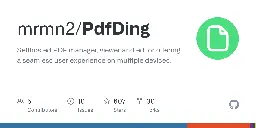
Hi /c/programming,
I am developing PdfDing - a selfhosted PDF manager, viewer and editor. You can find the repo here.
Today I reached a big milestone as PdfDing reached over 600 stars on github. A good portion of these stars probably comes from being included in the favorite selfhosted apps launched in 2024 on selfh.st.
Here is a quick overview over the project's features:
- Seamless browser based PDF viewing on multiple devices. Remembers current position - continue where you stopped reading
- Stay on top of your PDF collection with multi-level tagging, starring and archiving functionalities
- Edit PDFs by adding annotations, highlighting and drawings
- Clean, intuitive UI with dark mode, inverted color mode and custom theme colors
- SSO support via OIDC
- Share PDFs with an external audience via a link or a QR Code with optional access control
- Markdown Notes
- Progress bars show the reading progress of each PDF at a quick glance
As always I am happy if you star the repo or if someone wants to contribute.
-
Why hasn't gradle been adopted for C/C++ projects?
I know little about gradle and have only just started exploring it, so this is just a question out of curiosity.
It's supposedly a language agnostic dependency manager and builder, yet it seems to have only found its niche in Java. C/C++ projects could definitely do with dependency resolution...
-
How do you structure your models save/load code?
I have in mind two options:
- Code in the class being saved/loaded. The flows for each entity/model are in the same place, so it's easy to just have one file open to see all the functionalities of that class, but this means having more code in a single file.
- Code in a dedicated class (like a factory)
This makes each file smaller, but spreads flows of a single model into different parts of the repo, also because I'm thinking of having a directory
/src/modelsand another like/src/export(orserialize)
What do you guys think? What's your preferred way to organize the save and load flows?
- cefboud.github.io Taking a Look at Compression Algorithms
Dissecting various compression algorithms.
- semanticdiff.com What should semantic diffs highlight: The change or its effect?
Language aware diffs can detect changes in the semantics of the code that are invisible to traditional diffs. How should they be highlighted?
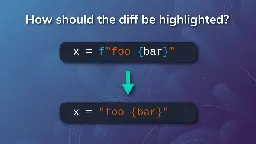
-
It is my practice to delete the hash lines after question marks in URLS to defeat tracking... but the question mark has disappeared


Please accept this in the ethos of no stupid questions.
The only programming I do is to defy tracking by deleting hash lines after ? In the url.
Some popular sites I am embarrassed to admit to even viewing have found a way around this by offering me share links without the ?.
It’s Instagram I am ashamed to mention.
What do I do to get rid of the tracking now?
-
I feel like I should know this but seems like no
How can i connect imagine a Qt interface(C++) with a logic in java. I feel like I've should know this already but I don't, I know there are API but I don't want to do it,
More context: They told me to write an aplication, game such as 4 connect, battleship or that kind of games, so I've thought to make the "snakes and ladders", i knew how i could do the 2 thinks separately but I don't know how to connect the frontend with backend, even tho I knew the games should works with threads. So I don't know if I could do it with the interface in Qt, because the main porpouse of the practice is to work with threads
-
What I worked on today: What is the superset of messages and requests? Hyper-requests, or I just call them edges.
ChatGPT formatted version here: https://goatmatrix.net/c/DevBlog/4zTzjEBMmg
Better formatted, a little cheesy.
-
Mastodon Bot?
I'm currently making a Mastodon Bot, and I'm not entirely sure how to host it, like where do i ensure the API Access Token's and such aren't at risk of public view.
I've made sure, and I haven't pushed yet, but I've ensured that
.envis inside.gitignore. I'm just unsure, and would love some help. This is just a little project I found on GitHub, and thought I'd might as well learn a few things of how things like this are developed. -
How does LLVM exactly work with WebAssembly's externref and funcref types?
I'm a D developer who recently got into the whole WASM thing with it using betterC (I do plan to write my own very minimalistic runtime to allow me using classes yet again), and currently I'm looking into enhancing the language's support of WASM in one way or another, especially when it comes to two "exotic" types of WASM,
externrefandfuncref(there's alsoexnref, but it's just before finalization, so I'm waiting a bit with that one).Me and others also programming in D have experimented with LDC (D compiler with LLVM backend) attributes since those types supposed to be address space 10 and 20 pointers, but I don't know whether the issue is that LDC doesn't handle type/pointer attributes the way we expected it to thus ending up generating
i32instead, or that I specifically need to emit the types for the LLVM backend. -
How to find project names?
I am currently searching for a name that I can use for a software project. Id like to have a short one that has no real meaning associated with it. I already asked some ai's. All names that I found sound terrible or have some meaning attached to it. . Like the name is already used for some medication or so.
How do you guys come up with names?
-
Implementing a form of websites white listing today, is it actually possible?
With all the CDNs and content been served from several locations for a single web page for example, would it be possible to implement a maintainable whitelist in something like a proxy? Does it makes sense? Or I would break half of the websites?
-
Roc programming language version 0.0.0-alpha1 released
github.com Release 0.0.0-alpha1 · roc-lang/rocWe're starting with a new release approach, these files will stay available permanently in contrast to the latest nightly. We now recommend most users to stick to 0.0.0-alpha releases instead of ni...
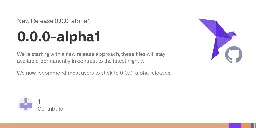
- blog.aurynn.com The That Guy Effect - The Particular Finest
If you got to see my talk about Human Driven Development at WDCNZ or LCA, you’ll remember that one of the concepts that I brought up was the idea of
-
How does Android partition works?
How can it have a system partition which is read only and still make the user create and use its files? How does it differ from Linux in terms of permissions and user management? How are the users kind of "confined" in android?
-
The seven programming ur-languages
> I regularly hear people asking which programming language to learn, and then reeling off a list of very similar languages (“Should I learn Java, C#, C++, Python, or Ruby?”). In response I usually tell them that it doesn’t really matter, as long as they get started. There are fundamentals behind them. > > What do I mean when I say fundamentals? If you have an array or list of items and you’re going to loop over it, that is the same in any imperative language. There is straightforward iteration and there is iterating over all unordered combinations and a few other patterns, but those patterns are basically the same in C, Java, Python, or Fortran. Having neural pathways that fluently express intention in these patterns, the same way you express thoughts in sentence structures in English, are fundamentals. > > But not all languages have the same set of patterns. The patterns for looping in C or Python are very different from the patterns of recursion in Standard ML or Prolog. The way you organize a program in Lisp, where you name new language constructs, is very different from how you organize it in APL, where fragments of symbol sequences are both the definitions of behavior and become the label for that behavior in your mind. > > These distinct collections of fundamentals form various ur-languages. Learning a new language that traces to the same ur-language is an easy shift. Learning one that traces to an unfamiliar ur-language requires significant time and effort and new neural pathways.
-
Contempt Culture
blog.aurynn.com Contempt Culture - The Particular FinestSo when I started programming in 2001, it was du jour in the communities I participated in to be highly critical of other languages. Other languages
> So when I started programming in 2001, it was du jour in the communities I participated in to be highly critical of other languages. Other languages sucked, the people using them were losers or stupid, if they would just use a real language, such as the one we used, everything would just be better. > > Right? > > This sort of culturally-encoded language was really prevalent around condemning PHP and Java. Developers in these languages were actively referred to as less competent than developers in the other, more blessed languages. > > And at the time, as a new developer, I internalised this pretty heavily. The language I was in was blessed, obviously, not because I was using it but because it was better designed than a language like PHP, less wordy and annoying than Java, more flexible than many other options. > > It didn’t matter that it was (and remains) difficult to read, it was that we were better for using it. > > I repeated this pattern for a really long time, and as I learned new languages and patterns I’d repeat the same behaviour in those new environments. I was almost certainly not that fun to be around, a microcosm of the broader unpleasantness in tech. > > At least, until I got called on it.

